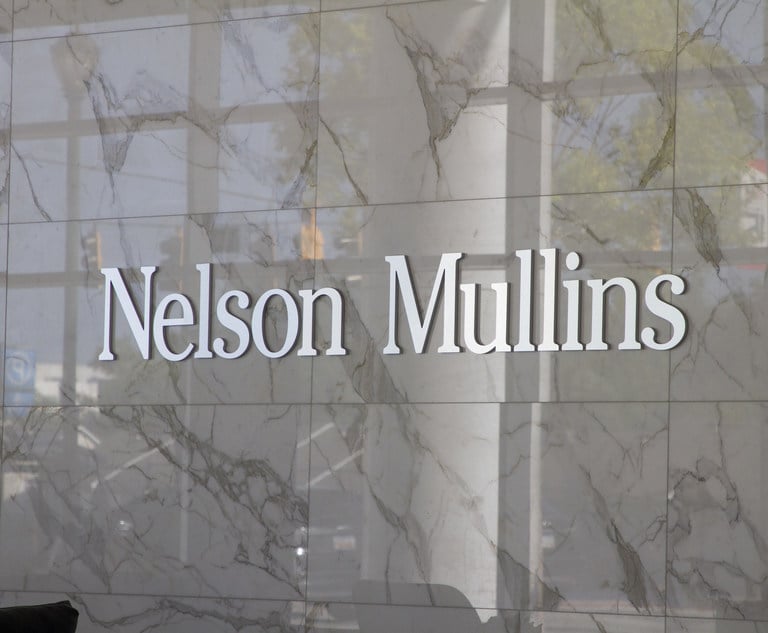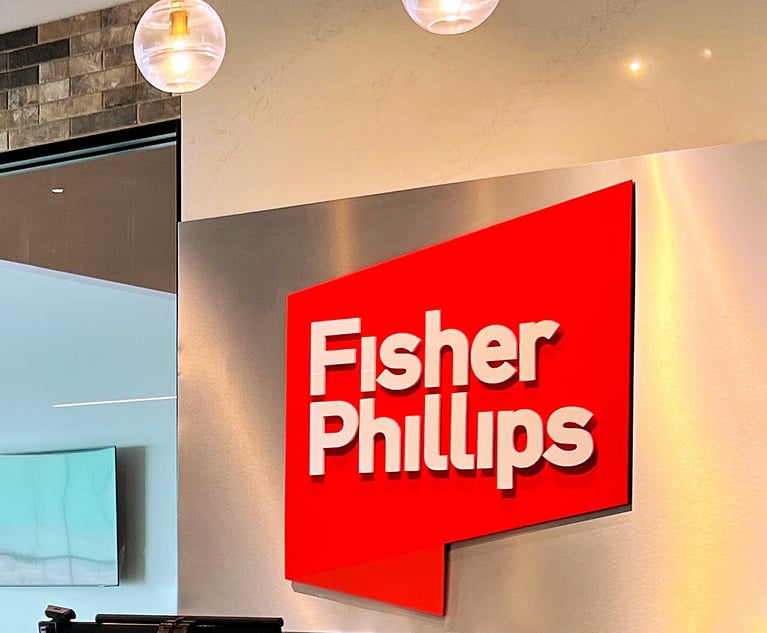 Dean Bo Rutledge, University of Georgia School of Law. (Photo: John Disney/ ALM)
Dean Bo Rutledge, University of Georgia School of Law. (Photo: John Disney/ ALM)UGA Law Students See Lighter Burden Amid Push to Rein in Debt
The University of Georgia and Georgia State University—the state's two public law schools—both have kept graduating students' debt loads well below the national average of $93,000 by keeping tuition low and leaning on donors.
December 06, 2018 at 02:43 PM
6 minute read
As law school tuition continues to rise and six-figure debt has become commonplace for newly minted J.D.-holders nationally, the University of Georgia School of Law has steadily reduced students' debt loads over the past five years, thanks to a tuition freeze and increased financial aid from donor-funded scholarships.
“We are committed to providing world-class education in a way that not only prepares students for careers and helps place them in jobs, but also allows them to graduate without the burden of an unreasonable level of debt,” said UGA Law Dean Bo Rutledge in his latest Dean's Report.
UGA Law students who graduated in 2018 carried an average debt load of $77,269, compared with $81,370 for the class of 2013, said Blake Waldrop, UGA Law's senior director of finance and administration.
That is well below the average total debt load of $93,000 nationally for new graduates of public law schools, according to Law School Transparency, which uses data that schools report to U.S. News & World Report and the American Bar Association.
Law student indebtedness at public schools peaked at $96,280 in 2015 and has declined by just under 4 percent since then, according to LST's data.
For those with J.D.s from private law schools, it's even worse. They graduated with an average debt load of $130,145, according to LST.
UGA Law, which has about 580 students, has been able to reduce aggregate student borrowing by roughly $1 million annually over the past five years from a total of $15.25 million in 2013 to $10.86 million in 2018, Waldrop said.
The average amount that UGA Law students borrowed has decreased by about $500 per year over that period, from $30,640 in 2013 to $28,140 last year.
Higher-Value Scholarships
Even as tuition has continued to rise at law schools nationally, many also have been increasing financial aid—or, at private law schools, discounting tuition—in an effort to keep student indebtedness from spiraling even higher.
UGA Law has reduced student indebtedness in three ways, Rutledge said in his report: freezing tuition since the start of his term in 2015, instituting cost control measures and making a significant increase in student financial aid.
Rutledge has made fundraising for student scholarship funds a priority over his tenure as dean. “By reducing the average debt load, we are giving them the opportunity to consider a wider range of career options as those decisions are driven by their passions rather than their finances,” he said in the report.
Tuition and fees for UGA Law have increased by less than $1,000 over the last five years, from $18,740 for 2013-2014 to $19,708 for the current academic year.
Meanwhile, UGA Law has significantly increased both the number and amount of scholarship grants from 2013 to 2018, according to ABA data.
For the 2017-2018 academic year, 65 percent of students received grants, up from 47 percent in 2012-2013. During that period, class size shrank by almost 100 students (from 663 in 2013), which bolsters the percentages slightly, but the law school increased its total number of students receiving grants by 57 students.
And the grants got a lot bigger. The median grant size almost doubled, from $5,000 to $9,500, and the percentage of students receiving half-tuition or greater more than doubled, from 12 percent (80 students) to 31 percent (174 students).
Capital Campaign
More scholarship dollars mean students can borrow less, Waldrop said.
UGA Law's push to increase scholarship funds started in earnest with a universitywide capital campaign that kicked off July 1, 2012, he said.
So far, donors have earmarked almost $28 million of their capital campaign contributions specifically for student scholarships out of the $39 million that the law school has raised toward its goal of $43 million by 2020.
UGA Law has even created a special webpage to make it easy for alums and other donors to choose what kind of scholarship to which they wish to contribute. Donors can choose to give to students who were the first in their family to go to college, for example, or to the new Benham Scholars Program for students—often minorities or from rural areas who may think law school is beyond their reach—or to veterans or those with top LSAT and GPA scores.
Best Value
Relatively low student indebtedness was one reason UGA Law ranked No. 1 on National Jurist's “Best Value Law School” list, released in October. The ranking is based on law schools' affordability and high bar-pass and employment rates for new graduates.
Georgia's other public law school, Georgia State University College of Law, again made the list as well, ranking at No. 12 this year. The “Best Value” list, unsurprisingly, is heavily dominated by public law schools.
GSU Law is even more affordable than UGA Law. The average debt load for its 2018 graduating class was $56,710. As at UGA Law, GSU Law has kept tuition low, increasing from $16,042 in 2013 to just $17,050 for 2018.
GSU Law also has increased grant awards. The school's median grant award increased from $7,500 in 2013 to $16,860 last year, which is significantly greater than the UGA Law median award of $9,500. GSU Law made grants of at least half-tuition to 164 or 26 percent of its students—just shy of the 174 UGA Law students receiving that much law school aid.
Significantly, GSU Law awarded full tuition grants to a whopping 119 recipients last year, representing 19 percent of its 632 students.
As another point of comparison, Emory University School of Law, which is private, gives grants of half-tuition or more to 38 percent (330) of its students—a higher percentage than at UGA Law or GSU Law. Emory charges $57,128 in tuition and fees, however—almost three times the cost for UGA Law.
This content has been archived. It is available through our partners, LexisNexis® and Bloomberg Law.
To view this content, please continue to their sites.
Not a Lexis Subscriber?
Subscribe Now
Not a Bloomberg Law Subscriber?
Subscribe Now
NOT FOR REPRINT
© 2024 ALM Global, LLC, All Rights Reserved. Request academic re-use from www.copyright.com. All other uses, submit a request to [email protected]. For more information visit Asset & Logo Licensing.
You Might Like
View All
On the Move: Hunton Andrews Kurth Practice Leader Named Charlotte Managing Partner
6 minute read
Husch Blackwell, Foley Among Law Firms Opening Southeast Offices This Year
9 minute read

Trending Stories
- 1Call for Nominations: Elite Trial Lawyers 2025
- 2Senate Judiciary Dems Release Report on Supreme Court Ethics
- 3Senate Confirms Last 2 of Biden's California Judicial Nominees
- 4Morrison & Foerster Doles Out Year-End and Special Bonuses, Raises Base Compensation for Associates
- 5Tom Girardi to Surrender to Federal Authorities on Jan. 7
Who Got The Work
Michael G. Bongiorno, Andrew Scott Dulberg and Elizabeth E. Driscoll from Wilmer Cutler Pickering Hale and Dorr have stepped in to represent Symbotic Inc., an A.I.-enabled technology platform that focuses on increasing supply chain efficiency, and other defendants in a pending shareholder derivative lawsuit. The case, filed Oct. 2 in Massachusetts District Court by the Brown Law Firm on behalf of Stephen Austen, accuses certain officers and directors of misleading investors in regard to Symbotic's potential for margin growth by failing to disclose that the company was not equipped to timely deploy its systems or manage expenses through project delays. The case, assigned to U.S. District Judge Nathaniel M. Gorton, is 1:24-cv-12522, Austen v. Cohen et al.
Who Got The Work
Edmund Polubinski and Marie Killmond of Davis Polk & Wardwell have entered appearances for data platform software development company MongoDB and other defendants in a pending shareholder derivative lawsuit. The action, filed Oct. 7 in New York Southern District Court by the Brown Law Firm, accuses the company's directors and/or officers of falsely expressing confidence in the company’s restructuring of its sales incentive plan and downplaying the severity of decreases in its upfront commitments. The case is 1:24-cv-07594, Roy v. Ittycheria et al.
Who Got The Work
Amy O. Bruchs and Kurt F. Ellison of Michael Best & Friedrich have entered appearances for Epic Systems Corp. in a pending employment discrimination lawsuit. The suit was filed Sept. 7 in Wisconsin Western District Court by Levine Eisberner LLC and Siri & Glimstad on behalf of a project manager who claims that he was wrongfully terminated after applying for a religious exemption to the defendant's COVID-19 vaccine mandate. The case, assigned to U.S. Magistrate Judge Anita Marie Boor, is 3:24-cv-00630, Secker, Nathan v. Epic Systems Corporation.
Who Got The Work
David X. Sullivan, Thomas J. Finn and Gregory A. Hall from McCarter & English have entered appearances for Sunrun Installation Services in a pending civil rights lawsuit. The complaint was filed Sept. 4 in Connecticut District Court by attorney Robert M. Berke on behalf of former employee George Edward Steins, who was arrested and charged with employing an unregistered home improvement salesperson. The complaint alleges that had Sunrun informed the Connecticut Department of Consumer Protection that the plaintiff's employment had ended in 2017 and that he no longer held Sunrun's home improvement contractor license, he would not have been hit with charges, which were dismissed in May 2024. The case, assigned to U.S. District Judge Jeffrey A. Meyer, is 3:24-cv-01423, Steins v. Sunrun, Inc. et al.
Who Got The Work
Greenberg Traurig shareholder Joshua L. Raskin has entered an appearance for boohoo.com UK Ltd. in a pending patent infringement lawsuit. The suit, filed Sept. 3 in Texas Eastern District Court by Rozier Hardt McDonough on behalf of Alto Dynamics, asserts five patents related to an online shopping platform. The case, assigned to U.S. District Judge Rodney Gilstrap, is 2:24-cv-00719, Alto Dynamics, LLC v. boohoo.com UK Limited.
Featured Firms
Law Offices of Gary Martin Hays & Associates, P.C.
(470) 294-1674
Law Offices of Mark E. Salomone
(857) 444-6468
Smith & Hassler
(713) 739-1250






